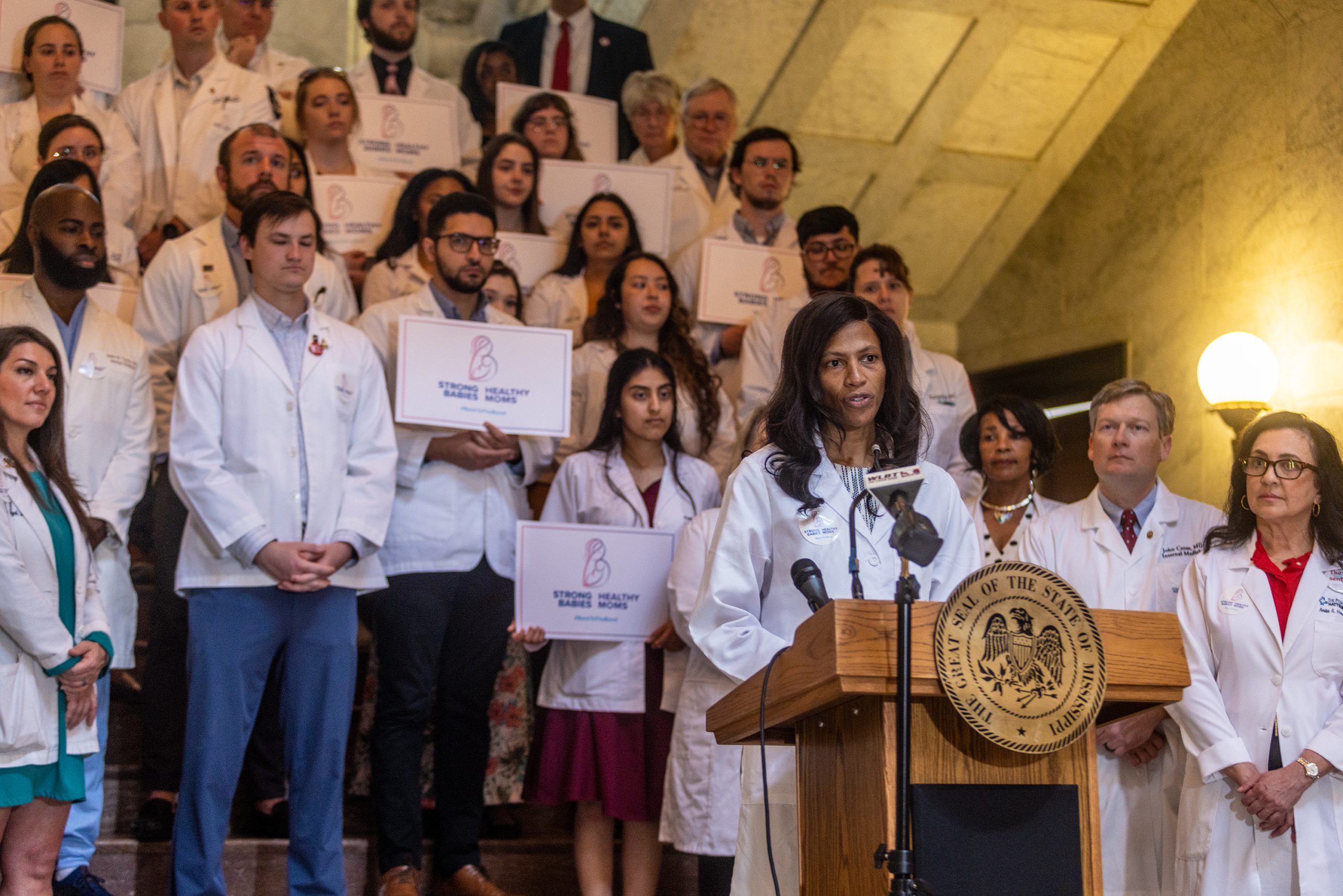Mississippi Today
FAQ: What is postpartum Medicaid extension, exactly?

FAQ: What is postpartum Medicaid extension, exactly?
Postpartum Medicaid extension is the talk of Mississippi politics this week, with lawmakers, statewide officials and candidates debating the merits of passing the policy designed to help mothers after they give birth.
Lawmakers face a key deadline this week to keep the proposed policy alive, and there is much disagreement about whether it's right for Mississippi. There have been several rallies and press conferences at the state Capitol this session focused on the issue, and it will continue to emerge as a key theme of the 2023 election cycle.
We've compiled answers to some frequently asked questions to help you understand what it is, what it isn't, and how its potential passage could impact Mississippians.
What is postpartum Medicaid extension, exactly?
Postpartum Medicaid extension is proposed legislation to extend the length of health care coverage for Mississippians on Medicaid who give birth. Postpartum visits can include care of chronic health conditions, such as diabetes and hypertension, as well as mental health issues that might arise after giving birth, such as postpartum depression.
Federal law mandates that states provide postpartum Medicaid coverage for at least 60 days, which is the current limit in Mississippi. After 60 days, most Medicaid patients lose postpartum health care coverage, and this period of time is often most deadly for mothers. Most states, however, have passed measures to extend postpartum Medicaid coverage to one full year post-birth — which is what the currently proposed Mississippi legislation would do.
READ MORE: Senate votes to extend postpartum care. Here's what the bill would do.
Would postpartum Medicaid extension provide cash directly to mothers?
No. Mississippi opting into the program would simply send additional federal funds to the state's Division of Medicaid, which would then reimburse health care providers directly for any care they provide to qualified mothers. Many politicians, however, have tried to equate Medicaid programs — including the postpartum Medicaid extension — with direct cash assistance in efforts to sow discontent among those opposed to more government spending.
Is postpartum care extension the same thing as Medicaid expansion?
No, postpartum Medicaid extension is not the same thing as Medicaid expansion, despite what prominent elected officials and candidates have said. The proposed postpartum extension would simply extend the length of time Mississippians who already qualify can access postpartum services. Medicaid expansion, which has never been seriously considered by Mississippi's legislative leaders, would broadly cover health care services for hundreds of thousands of additional Mississippians. “Medicaid expansion,” as it's commonly referred to by politicians, is a completely separate issue from “postpartum Medicaid extension.”
FAQ: What is Medicaid expansion, really?
What's the background of this debate, and why does it matter right now?
Mississippi has one of the highest maternal mortality rates in the country, and it's getting worse. The state also has the highest infant mortality rate, preterm birth rate and low birthweight rate in the country. Despite these problems, neonatal ICUs and labor and delivery units continue to close in the state — and the state is expecting thousands more births following the U.S. Supreme Court's decision to overturn abortion rights last summer.
Because two-thirds of babies born in Mississippi are born to people on Medicaid, extending postpartum coverage would boost the access to care and health outcomes of thousands of Mississippians, health care officials and researchers say. Doctors, nurses and major medical associations in the state have joined a growing chorus of everyday Mississippi this legislative session calling for postpartum Medicaid extension.
READ MORE: ‘Mississippi moms can't wait': Doctors urge legislators to extend postpartum coverage
Who qualifies for postpartum Medicaid coverage?
In Mississippi, pregnant people under 19 years old automatically qualify for pregnancy Medicaid, as well as pregnant people with income under 194% of the federal poverty level, or $2,255 of monthly income for a family of one.
How long are Mississippians who are expecting covered now?
Mississippians on Medicaid have postpartum coverage for two months after giving birth. However, regardless of what postpartum needs they might have beyond 60 days, they lose coverage after that. Research shows that drastic health problems for mothers exist and continue to develop well after two months postpartum.
Have other states extended postpartum Medicaid?
Yes, 29 other states have extended postpartum Medicaid coverage to one year, and seven additional states are planning to offer the extension imminently. States that have also extended postpartum care include contiguous neighbors Alabama, Louisiana and Tennessee. Mississippi and Wyoming are the only two states that have neither extended postpartum coverage nor expanded Medicaid more broadly.
Why hasn't it passed yet in Mississippi?
Though the Mississippi Senate has passed postpartum Medicaid extension four times in two years (and most recently on Feb. 7 of this year), the legislation has been killed by the House of Representatives — and specifically, by Speaker of the House Philip Gunn. The House Medicaid Committee appears to not have met once this session, an important note considering the postpartum Medicaid extension legislation must pass through that committee to go into effect.
READ MORE: Pressure grows for lawmakers to pass postpartum Medicaid extension
The chair of the House Medicaid Committee, Rep. Joey Hood, refused to answer last week when asked about whether his committee will meet or take up the Senate bill. Gov. Tate Reeves, who has for months voiced his opposition to the legislation, reversed course and urged lawmakers to pass it on Feb. 26. As recently as Feb. 22, Gunn said he would not allow the legislation to be brought to the House floor because he believes it is Medicaid expansion, which he staunchly opposes.
READ MORE: How Rep. Joey Hood could save the lives of countless Mississippi mothers
Who supports it and why?
Statewide organizations and health professionals have advocated for the policy change, including State Health Officer Dr. Dan Edney, the Mississippi State Medical Association, the Mississippi Medical Care Advisory Committee and the Mississippi Economic Council. Additionally, a Mississippi Today survey conducted this session showed that a majority of lawmakers — including members of the House — support the policy measure. Recent polling of Mississippi voters shows that more than two-thirds of the state supports the measure. Advocates say it will widely improve health outcomes in Mississippi.
READ MORE: Survey: Majority of lawmakers support postpartum Medicaid extension
What would the economic impact of passing it be?
Officials and advocates have said that postpartum Medicaid extension would result in net savings for the state by preventing costly medical conditions from lack of treatment. Premature babies can cost the state more than half a million dollars more than babies born at term. It's estimated that extending postpartum Medicaid coverage in Mississippi would cost about $6 million to $7 million per year, which is a marginal total considering the state's current $3.9 billion surplus.
Who can extend postpartum Medicaid?
It's still not clear if Gov. Reeves could pass the policy on his own as head of the state's Division of Medicaid, though legislative leaders have long said that Reeves has the power to extend postpartum Medicaid coverage without their approval. Reeves recently said if the Legislature passed the bill, he would sign it into law, but he did not address the stated fact that he could pass it himself.
READ MORE: Gov. Tate Reeves, after months of resistance, asks lawmakers to pass postpartum Medicaid extension
What's next?
If Rep. Joey Hood doesn't call a House Medicaid Committee meeting and pass the Senate bill by midnight on Feb. 28, the measure will die for the second straight year in the House. It is possible (but perhaps unlikely) lawmakers could revive the measure later in the session, which is scheduled to end on April 2.
This article first appeared on Mississippi Today and is republished here under a Creative Commons license.
Mississippi Today
On this day in 1951


April 28, 1951

Ruby Hurley opened the first permanent office of the NAACP in the South.
Her introduction to civil rights activism began when she helped organize Marian Anderson's 1939 concert at the Lincoln Memorial. Four years later, she became national youth secretary for the NAACP. In 1951, she opened the organization's office in Birmingham to grow memberships in Alabama, Florida, Georgia, Mississippi and Tennessee.
When she arrived in Mississippi, there were only 800 NAACP members. After the governor made remarks she disagreed with, she wrote a letter to the editor that was published in a Mississippi newspaper. After that step in courage, membership grew to 4,000.
“They were surprised and glad to find someone to challenge the governor,” she told the Chicago Defender. “No Negro had ever challenged the governor before.”
She helped Medgar Evers investigate the 1955 murder of Emmett Till and other violence against Black Americans. Despite threats, she pushed on.
“When you're in the middle of these situations, there's no room for fear,” she said. “If you have fear in your heart or mind, you can't do a good job.”
After an all-white jury acquitted Till's killers, she appeared on the front cover of Jet magazine with the headline, “Most Militant Negro Woman in the South.”
Months later, she helped Autherine Lucy become the first Black student at the University of Alabama.
For her work, she received many threats, including a bombing attempt on her home. She opened an NAACP office in Atlanta, where she served as a mentor for civil rights leader Vernon Jordan, with whom she worked extensively and who went on to serve as an adviser to President Bill Clinton.
After learning of Evers' assassination in 1963, she became overwhelmed with sorrow. “I cried for three hours,” she said. “I shall always remember that pool of blood in which he lay and that spattered blood over the car where he tried to drag himself into the house.”
She died two years after retiring from the NAACP in 1978, and the U.S. Post Office recognized her work in the Civil Rights Pioneers stamp series. In 2022, she was portrayed in the ABC miniseries, “Women of the Movement.”
This article first appeared on Mississippi Today and is republished here under a Creative Commons license.
Mississippi Today
Rare open negotiations occur on important Medicaid expansion issue
The curtain was pulled back last week for the first time in years on the Mississippi Legislature's often mysterious conferencing process.
A conference committee consists of three representatives and three senators appointed to try to reach agreement when the two chambers pass differing versions of the same bill. Last week, a conference committee formed to try to reach agreement on Medicaid expansion caused a stir by meeting in a public setting.
Even though the joint rules of the Mississippi Legislature call for an open conferencing process, the conferees seldom meet in public. They usually meet and negotiate their differences near the end of the session behind closed doors.
That was not always the case.
For a period in the late 1990s and early 2000s, the Legislature, under intense pressure from the Mississippi Press Association, made open conference committees the norm.
Some major issues have been played out in public conference committees. Notable open conferences include:
- The infamous, excruciatingly long special session in 2002 where businesses received more protection from lawsuits.
- Budget fights when Haley Barbour was governor when legislators often would reach an impasse in the negotiations process and spend the bulk of their time talking about their cars and eating candy.
- The major rewrite of the state's economic development package under then-Gov. Ronnie Musgrove called Advantage Mississippi.
- The Mississippi Adequate Education Program, which for decades has provided the state's share for the basic operation of local school districts. It was hammered out in an open conference process in 1997 even before the joint rules mandated the open process.
Then-state Sen. Musgrove and former House Speaker Billy McCoy deserve credit or blame, according to one's perspective, for proving the open conference process could work. When they chaired their respective chamber's education committees, they insisted on having an open conference process.
But in more recent years, open conference committees have been few and far between. The joint rule has been largely ignored.
The fact that the three House and three Senate conferees agreed to meet at least once in public on Medicaid expansion — one of the most pivotal issues facing the Legislature in recent years — drew considerable attention.
If nothing else, the open conference committee provided a raw and unedited view of how far apart the two chambers were at the time on an issue that would provide additional health care coverage to primarily the working poor.
The House wanted to provide coverage to those earning up to 138% of the federal poverty level, or about $20,000 annually for an individual, while the Senate had proposed providing coverage to those earning less than 100% of the federal poverty level, or about $15,000 per year.
According to various experts, the House plan would provide coverage to many more working Mississippians and cost less to the state than would the Senate plan. The reason for the lower cost to the state is that when expanding to 138%, the federal government will pay 90% of the costs and provide the state an additional roughly $700 million over two years as an enticement to expand.
Under the Senate plan, the federal government will pay 77% of the cost and offer no incentives. It is important to understand that in the expensive world of health care, the difference in 77% of the cost and 90% means tens of millions to Mississippi state coffers.
The House conferees repeatedly pointed out those numbers — their plan covering more at less cost — during last week's open conference committee.
One of the reasons legislators through the years have not been enamored with an open conference process is that it has often turned into efforts by the negotiators to sell their position to the public.
Once the open conference process starts, the side that feels the most comfortable with its position wants to meet more often in full view of the public to make sure the public understands where each side stands.
For whatever it is worth, the House conferees were more enthusiastic about continuing the open process after the initial Medicaid expansion conference committee.
And after that initial open conference, the Senate offered a compromise to cover those earning up to 138% of the federal poverty level — just as the House proposed.
This article first appeared on Mississippi Today and is republished here under a Creative Commons license.
Mississippi Today
Legislation to strip key power of PERS Board passes both chambers
Legislation that strips significant power from the board that governs the state's public employee pension program has passed both chambers of the Legislature.
Under the legislation set to go to Gov. Tate Reeves during the final days of the 2024 session, the Public Employees Retirement System Board would no longer have the authority to increase the contribution rate levied on governments (both on the state and local level) to help pay for the massive retirement system.
The legislation, which passed both chambers in recent days, was a reaction to the decision by the board to increase by 5% over a three-year period the amount local governments contribute to each employee's paycheck for their retirement. Under the PERS Board plan, the employer contribution rate would have been increased to 22.4% over three years, starting with a 2% increase on July 1.
The board said the increase was needed to ensure the long-term financial stability of the system that pays retirement benefits for most public employees on the state and local levels, including staff of local school districts and universities and community colleges.
City and county government officials in particular argued that the 5% increase would force them to cut government services and lay off employees.
Under the bill passed by the Legislature there still would be a 2.5% increase over five years — a .5% increase in the employer contribution rate each year for five years.
In addition, legislative leaders said they plan to put another $100 million or more in state tax dollars into the retirement system in the coming days during the appropriations process.
Under current law, the PERS Board can act unilaterally to increase the amount of money governmental entities must contribute to the system. But under the new bill that passed both chambers, the board can only make a recommendation to the Legislature on increasing the employer contribution rate.
The PERS Board also would be required to include an analysis by its actuary and independent actuaries on the reason the increase was needed and the impact the increase would have on governmental entities.
In the 52-member Senate, 14 Democrats voted against the bill. Only one House member voted against the proposal.
Sen. David Blount, D-Jackson, said the bill failed to address the financial issues facing the system. He said a permanent funding stream is needed.
Blount said, “You are moving in the wrong direction and weakening the system” with the bill the Legislature approved. “Is it painful? Is it going to cost more money? Yes, but we need to do it” to fix the system.
The system has assets of about $32 billion, but debt of about $25 billion. But Sen. Daniel Sparks, R-Belmont, and others argued that the debt was “a snapshot” that could be reduced by strong performance from the stock market. The system depends on its investments and contributions from employers and employees as sources of revenue.
The system has about 360,000 members including current public employees and former employees and retirees.
The legislation states that no changes would be made for current members of the system. The legislation does reference looking at possibly changing the system for new employees. But that would be debated in future legislative sessions.
The bill does not include an earlier House proposal to dissolve the PERS Board, which consists primarily of people elected by the members of the system, and replace them with political appointees.
This article first appeared on Mississippi Today and is republished here under a Creative Commons license.
-
Local News4 days ago
Sister of Mississippi man who died after police pulled him from car rejects lawsuit settlement
-
Mississippi Today4 days ago
At Lake High School in Scott County, the Un-Team will never be forgotten
-
Mississippi Today15 hours ago
On this day in 1951
-
Mississippi News2 days ago
One injured in Mississippi officer-involved shooting after chase
-
Mississippi News6 days ago
Cicadas expected to takeover north Mississippi counties soon
-
Mississippi News5 days ago
Viewers make allegations against Hatley teacher, school district releases statement – Home – WCBI TV
-
Mississippi News Video4 days ago
Vehicle struck and killed man lying in the road, Alcorn County sheriff says
-
Mississippi Today7 days ago
On this day in 1892



































